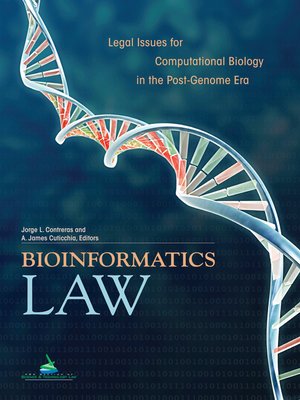Bioinformatics Law
ebook ∣ Legal Issues for Computational Biology in the Post-Genome Era
By Jorge L. Contreras

Sign up to save your library
With an OverDrive account, you can save your favorite libraries for at-a-glance information about availability. Find out more about OverDrive accounts.
Find this title in Libby, the library reading app by OverDrive.



Search for a digital library with this title
Title found at these libraries:
| Loading... |
The human genome sequence is being studied in thousands of laboratories across the world, new associations between genetic variations and disease and physiological traits are announced each week, and the databases containing the accumulated genomic data of the research community are growing at rates that are orders of magnitude greater than those seen by the original HGP. We are living in what many have termed the "post-genome" era, a time in which the availability of the human genome sequence is taken as a given, and in which it serves not as the goal, but as a starting point for multiple new and innovative research endeavors. In this concise volume, you'll find a collection of cutting-edge research and commentary from leading scholars, bioethicists and legal practitioners in an attempt to cover the broad and ever-changing intersection of law and bioinformatics. The book begins with an overview of the evolving bioinformatics field then explores legal issues surrounding the software tools that enable large-scale computational biology, including procurement and licensing of commercial software systems, in-house and contracted software development and issues surrounding open source software. The book also covers the complex intellectual property landscape that characterizes the field, first addressing patents on computer software, algorithms and related inventions, and then moving to the highly contested issues surrounding patents on human genetic material. Also covered are the legal aspects of the research environments in which bioinformatics work is increasingly conducted, including biopharma collaborations and university R&D. Additionally, you'll find information on the novel legal issues arising from the development and use of standardized technologies in bioinformatics, the protection and use of databases in bioinformatics research and important issues relating to patient and research subject data, including information security and privacy, informed consent and public health surveillance. The field of bioinformatics continues to evolve rapidly, while the legal rules, doctrines and practices attempt to catch up. This volume is a useful resource for lawyers, researchers, policy makers and scholars who seek insight into the complex intersection of law and bioinformatics in this post-genome era. Databases containing the accumulated genomic data of the research community are growing exponentially. This book contains cutting-edge insights from scholars, bioethicists and legal practitioners who work at the ever-changing intersection of law and bioinformatics. Bioinformatics Law examines legal issues associated with software tools for large-scale computational biology, including procurement and licensing of commercial software systems, in-house and contracted software development, and open source software. Other topics include: • The complex intellectual property landscape that characterizes this field, including patents on computer software, algorithms and related inventions, and highly contested issues surrounding patents on human genetic material • Legal considerations for research environments: biopharma collaborations, the use of standardized technologies in bioinformatics, and protection and use of databases in bioinformatics research • Patient and subject data; information security and privacy, informed consent, and public health surveillance






